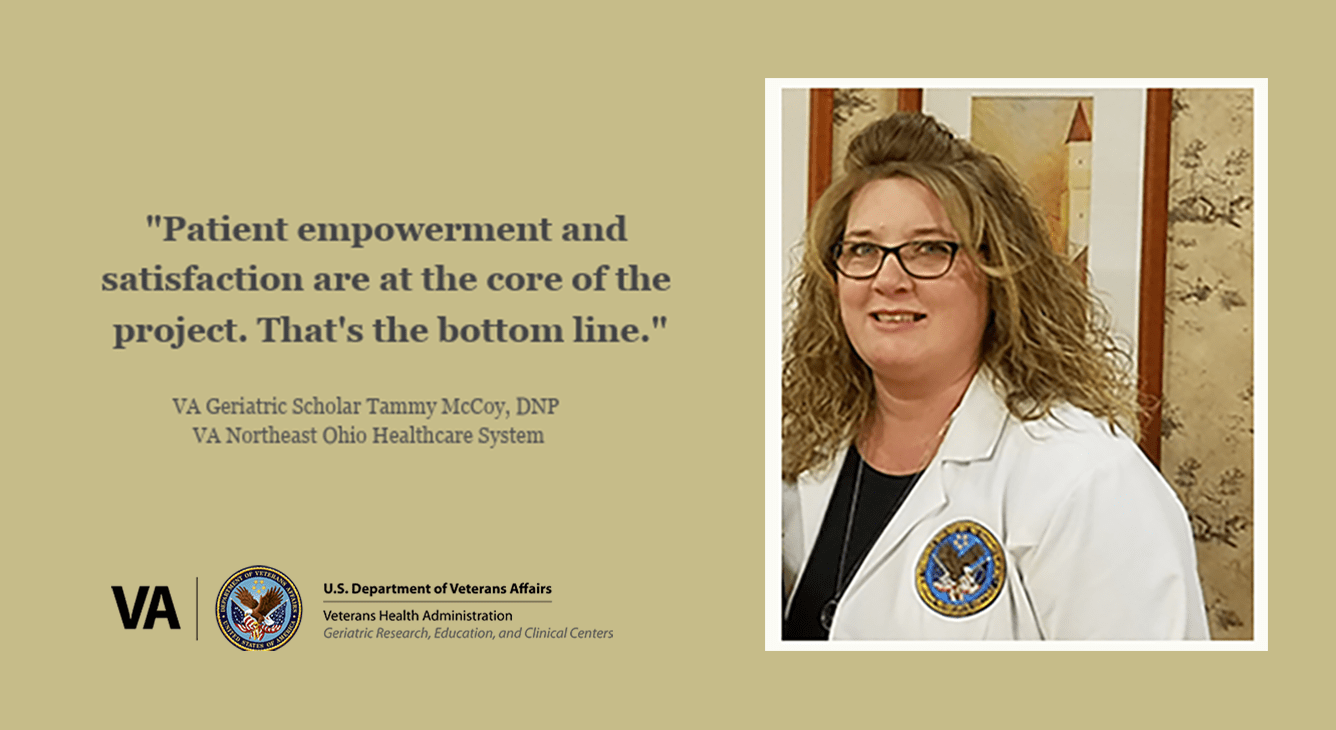A telephone outreach intervention launched by VA Geriatric Scholar Tammy McCoy, DNP, reduced acute episodes of chronic obstructive pulmonary disease (COPD) among older Veterans. This intervention reduced patients’ use of VA health care resources and helped Veterans improve their quality of life.
Dr. McCoy and her Patient Aligned Care Team (PACT) from VA’s rural outpatient clinic in East Liverpool, Ohio, randomly recruited a group of 10 geriatric Veterans with a range of COPD severity. After receiving a flu vaccine that included protection from pneumonia, each Veteran received individualized, proactive health care visits by telephone each week for six weeks.
Improvements in health
During the outreach intervention, none of the Veterans required emergency care for the treatment of escalating COPD. This proved a stark contrast from the same period a year earlier when the 10 Veterans used VA emergency care resources six times in six weeks. Their clinic visits dropped by half, from eight to four, and the Veterans also made fewer calls to the clinic.
Optimizing VA resources
The team’s proactive outreach intervention increased Veterans’ access to care using resources already on hand.
“They felt their care was personalized. They felt empowered. We’re making the patient happy. And we’re freeing those resources for other Veterans,” said Dr. McCoy.
VA Geriatric Scholars Program
Dr. McCoy is an alumna of the VA Geriatric Scholars Program, a workforce development program to integrate geriatrics into primary care practices. VA’s Office of Rural Health and Geriatrics/Extended Care funds the program.
A core learning component for all Geriatric Scholars is to develop a local quality improvement (QI) project relevant to their older patients. Geriatric Scholars use the Model for Improvement, which requires a demonstration that any change is a measurable improvement.
The team sought to implement PACT proactive care management interventions. Their goal was to reduce VA resource use while improving patient quality of life–by achieving a 50% reduction in acute episodes of COPD during the project period. The measures of improvement were participants’ total number of clinic telephone calls, clinic visits, and acute care visits, either inpatient or at the emergency department.
Effective management of COPD
The project team identified the leading causes of recurrent COPD exacerbations that led to the increased use of VA resources. The causes included multiple, complex health conditions, such as heart failure, diabetes, or high blood pressure; poor lifestyle choices, such as alcohol abuse or substance and tobacco use; lack of exercise, or poor diet; and non-compliance with inhaled therapies for COPD or miseducation about how to use them.
The team identified the root causes that led to the development of talking points for the team’s patient outreach. “We all got on the same page so that we’re giving the same information to the patient,” said Dr. McCoy.
The team contacted these Veterans weekly to review medications, positive lifestyle changes, signs and symptoms of infection and prevention, reportable symptoms, and immunizations. They engaged patients to remain compliant with medications and the flu vaccine to help reduce COPD flare-ups.
Transforming the patient experience
“Key to our project is making sure that it’s mindful management of the patients. They get individual time on the telephone while their medications are in front of them to really focus,” said Dr. McCoy. “Patient empowerment and satisfaction are at the core of the project. That’s the bottom line.”
The PACT team exceeded their project goals. They achieved a 100% reduction in participants’ hospital or emergency room visits, a 50% reduction in clinic visits, and a 95% reduction in inbound clinic calls.
Dr. McCoy plans to extend her Geriatric Scholar project beyond her East Liverpool outpatient clinic to engage more patients enrolled with the VA Northeast Ohio Healthcare System. “I’m working with nursing management to expand to other chronic disease management and to make these proactive interventions standard operating protocol so that we can integrate them into the PACT model,” added Dr. McCoy.
For more, visit the VA Geriatric Scholars Program.
Maureen Jerrett is a communications contractor with the VA Geriatric Scholars Program
Topics in this story
More Stories
Veteran Byron Potier weighed almost 300 pounds and was tired and lethargic. He was the perfect candidate for gastric sleeve surgery.
How much do you know about VA care, benefits and services? Don’t miss out on what you've earned—check out the "2025 VA Federal Benefits Guide for Veterans, Dependents, Survivors, and Caregivers" handbook to learn more.
Feeling stressed? Your breath can help you relax and focus. Take 3 minutes to reset and prioritize your well being for this week's #LiveWholeHealth practice.







Hello,
this is a very interesting subject.I am a German medical journalist and would be interested in more information. Is there a publication available or planned? Couldn’t find anything.Are you planning to expand it to more patients (10 is a little few)
Thanks a lot
Markus